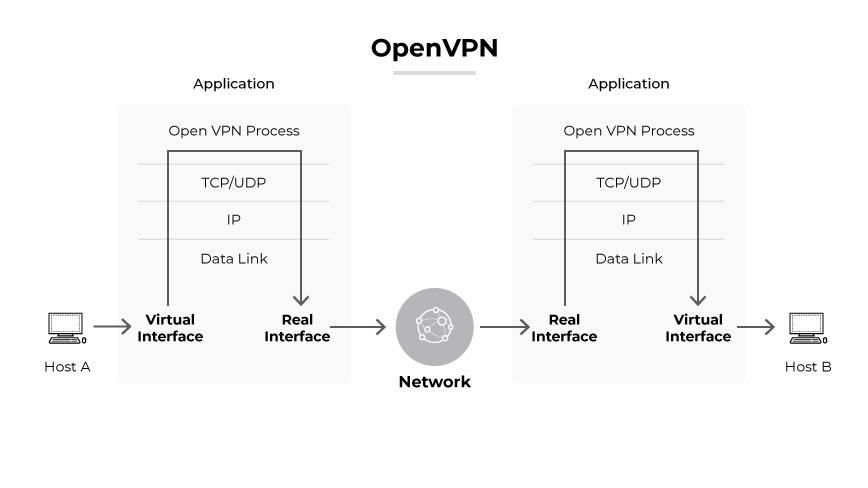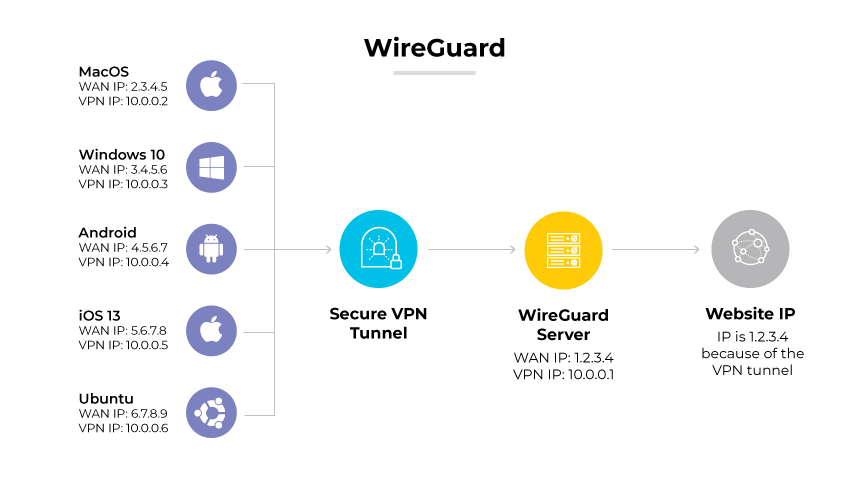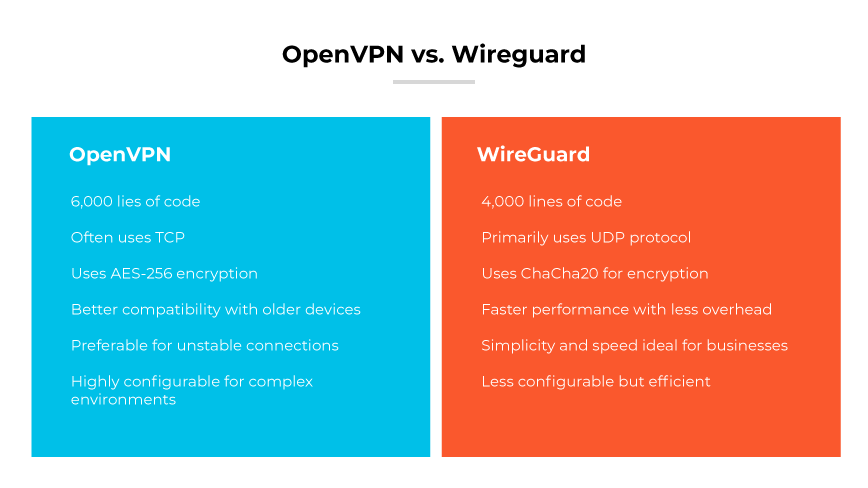- What Is WireGuard?
- What Is a VPN Tunnel?
- What Is a Business VPN? Understand Its Uses and Limitations
- What Is Network Segmentation?
- Ivanti VPN Vulnerability: What You Need to Know
-
Replacing Legacy VPN and NAC Solutions with a Next-Generation Network Security Client for Endpoints
- VPN Security: Are VPNs Safe and Secure?
- What Is SSTP (Secure Socket Tunneling Protocol)?
- What is Remote Access?
- What Is PPTP (Point-to-Point Tunneling Protocol)?
- What Is L2TP (Layer 2 Tunnel Protocol)?
- What Is IPsec?
- What Is IKE (Internet Key Exchange)? | IKE Meaning
- What Is an SSL VPN?
- What Is a Remote Access VPN?
- What Is a Cloud VPN?
-
Secure Remote Access | Protect Remote Employees from Cyberthreats
- IPsec vs. OpenVPN: What Are the Differences?
- What is Quality of Service?
- What is a Data Center?
- SSL VPN vs. IPSec: What Are the Differences?
- How to Set Up a Virtual Private Network (VPN)?
- How Does a VPN Work?
-
What Is the History of VPN?
- 1960s–1970s: The Dawn of ARPANET and the Need for Connectivity Across Different Networks
- 1980s: TCP/IP and the Public's Introduction to the Internet
- 1990s: The Rise of the Web and Emergence of Early VPN Technologies
- 2000s: VPNs Evolve Alongside Cybersecurity Challenges
- 2010s: A Decade of Digital Transformation
- 2019–Present: The Response to Remote Work and Limitations of VPNs
- VPN History FAQs
- SoftEther vs. OpenVPN: What Are the Differences?
- What Are the Different Types of VPN?
- What Are the Different Types of VPN Protocols?
- VPN Alternatives for Remote Access
- VPC vs. VPN vs. VPS: What Are the Differences?
- What Is a Double VPN?
- What Is a Site-to-Site VPN?
-
What Is a VPN Concentrator?
- How Does a VPN Concentrator Work?
- Why Use a VPN Concentrator?
- VPN Concentrator Benefits
- VPN Concentrator Disadvantages
- VPN Concentrator Encryption Protocol Types
- VPN Concentrator vs. VPN Router
- VPN Concentrator vs. Site-to-Site VPN
- VPN Concentrator vs. IPsec Encryption
- VPN Concentrator vs. VPN Client
- VPN Concentrator FAQs
- What Is a VPN Gateway?
- What Is IKEv2 (Internet Key Exchange version 2)?
- What Is OpenVPN?
-
What Is SoftEther (Software Ethernet)?
- How Does the SoftEther VPN Protocol Work?
- What Is a SoftEther VPN?
- SoftEther VPN Architecture
- How Secure Is the SoftEther VPN Protocol?
- Pros and Cons of SoftEther
- How to Use SoftEther VPN
- Comparing SoftEther with Other Protocols
- The History of SoftEther
- Does SoftEther Work In Enterprise Environments?
- SoftEther FAQs
WireGuard vs. OpenVPN | What Are the Differences?
The differences between WireGuard and OpenVPN include WireGuard's more modern, lean codebase designed for speed and simplicity, and OpenVPN's mature, feature rich environment that offers and compatibility.
WireGuard uses state-of-the-art cryptography for secure, high speed connections. OpenVPN provides time tested reliability and supports a broader range of configurations. Choosing between the WireGuard and OpenVPN protocols depends on specific security needs, performance requirements, and the existing technological ecosystem.
What Is OpenVPN?

OpenVPN is a widely adopted open source VPN protocol known for its ability to facilitate encrypted connections over the internet. It provides strong encryption, authentication capabilities, and the versatility to handle different network arrangements. OpenVPN is adaptable. The protocol supports a range of VPN configurations, from bridging discrete networks to enabling remote user access.
As both a software project and a tunneling protocol, OpenVPN is instrumental in establishing secure paths for data transit between clients and servers. It achieves this through encrypted channels that shield data packets as they travel across the internet. OpenVPN can operate over two principal modes: TCP and UDP. TCP is known for reliable packet delivery. UDP is known for its speed, which is beneficial for time sensitive transmissions like live video or voice.
OpenVPN's support extends to both IPv4 and IPv6 protocols, allowing for seamless operation across modern and legacy network infrastructures. These protocols determine how IP addresses appear on the internet. OpenVPN employs the OpenSSL library for encryption tasks, using SSL/TLS protocols for the key exchange. This method supports encryption up to 256-bit with sophisticated cipher suites.
OpenVPN supports adding custom directives within its configuration. Custom directives can be used to allocate fixed IP addresses to VPN clients or redirect traffic through a proxy server after establishment of the VPN link.
The strength of OpenVPN also lies in its software capability, which simplifies the management of VPN services for enterprises. It offers an intuitive admin web interface that streamlines VPN server and access management. OpenVPN is compatible with various operating systems. The protocol also offers features like network bridging and split tunneling. These attributes make OpenVPN a potential solution for complex network environments.
What Is WireGuard?

WireGuard is a modern VPN protocol acclaimed for its blend of security and simplicity. The WireGuard protocol facilitates secure network connections with an emphasis on streamlined operation. The protocol is recognized for rapid deployment capabilities, attributed to its lean codebase. WireGuard’s lean code codebase inherently reduces susceptibility to security vulnerabilities and eases the process of code review.
WireGuard's uses advanced cryptographic techniques to create secure VPN tunnels for network traffic. The protocol is distinctive for employing a single, consistent suite of state-of-the-art cryptographic algorithms. This mitigates the risk of configuration errors and strengthens security posture.
WireGuard's architecture stands on a foundation of trusted cryptographic primitives that ensure secure data transmission. It uses the Noise protocol framework to establish a secure handshake. The secure handshake completes in 1.5 round trip times, facilitating near instantaneous VPN connection setups while ensuring perfect forward secrecy.
WireGuard uses static public keys for the identification of network peers. This approach simplifies network configuration and routing processes, similar to the operation of SSH keys. WireGuard's default setup enhances its security. It does not store any personally identifiable information or persistent user data. This feature strengthens its defense against common cyberattacks and lowers the risk of data breaches.
WireGuard's codebase is remarkably compact, consisting of fewer lines than traditional security VPN protocols. The complete protocol is implemented in less than 4,000 lines of code for the Linux kernel. This compactness aids in the protocol's agility and speed and contributes to its security by offering a smaller attack surface. Its solid cryptographic core and simplified code structure position WireGuard as an option for businesses that prioritize secure, efficient network tunneling solutions.
OpenVPN vs. WireGuard

OpenVPN has long been the standard in security VPN protocols, recognized for robust encryption and versatility. It uses OpenSSL libraries for encryption. OpenVPN supports a myriad of cryptographic algorithms and employs SSL/TLS for key exchange. This affords the protocol up to 256-bit encryption for secure data transmission. OpenVPN operates in TCP and UDP modes, balancing reliability with speed. OpenVPN has the ability to manage complex enterprise network configurations because of its flexibility and compatibility with a wide range of operating systems.
WireGuard, on the other hand, is a newer entrant in the field that has gained notice for its lightweight design and high speed performance. It is designed to be more secure and faster than OpenVPN. WireGuard uses a simplified cryptographic approach with a fixed set of modern, high speed algorithms for key exchange. WireGuard's lean codebase makes it easier to audit and potentially reduces its attack surface. The protocol can be fitting in scenarios where speed and ease of deployment are paramount without significantly compromising security.
In comparing the two, OpenVPN has been battle tested over a longer period, and offers more configuration options. The protocol is often viewed as trustworthy and reliable in enterprise deployments. WireGuard's minimalist approach offers a speed advantage, making it an option for newer systems that prioritize fast, simple setup. OpenVPN's widespread adoption and proven track record make it a go-to for many businesses. OpenVPN tends to be preferred for organizations who require fine grained control over VPN behavior and security.
Does OpenVPN or WireGuard Have Better Encryption?
In comparing OpenVPN and WireGuard encryption, both protocols offer robust protection with key differences.
OpenVPN is highly flexible. It supports a range of encryption methods through the OpenSSL library, with common implementations using AES-256 for cipher strength, a 2048-bit RSA handshake, and HMAC SHA-1 for authentication. The flexibility introduces risks if not correctly implemented, requiring adherence to strict security standards by VPN providers.
WireGuard simplifies encryption by using a fixed suite of modern cryptographic protocols: ChaCha20 for encryption, Poly1305 for authentication, Curve25519 for key exchange, BLAKE2s for hashing, and SipHash for hashing identifiers. This reduction in complexity minimizes the risk of improper deployment and avoids downgrade attacks, making WireGuard's encryption easier to manage and audit.
OpenVPN's strengths are versatility and well tested security. WireGuard's standardized encryption model offers a streamlined, potentially more secure approach (assuming the absence of unforeseen vulnerabilities).
How Safe Are Newer Encryption Algorithms?
Newer encryption algorithms are designed to be inherently secure. The safety of newer encryption algorithms is reinforced by the cybersecurity community's ongoing scrutiny and adaptation to emerging threats.
Encryption algorithms play a crucial role in protecting data. The advent of newer encryption methods has introduced sophistication that enhances the security of transmitted information. These algorithms, like ChaCha20 and Poly1305, provide advanced encryption standards that are robust against brute force attacks and other forms of cryptographic assaults.
The design of newer algorithms often includes larger key sizes and more complex encryption patterns. The complexity deters potential hackers and makes the algorithms resilient to various attack vectors. Modern cryptographic protocols used by WireGuard, including Curve25519 for key exchange and BLAKE2s for hashing, exemplify this approach by balancing efficiency with a formidable defense mechanism.
Fixed algorithm sets in protocols like WireGuard simplify the implementation process and reduce the likelihood of human error, which is a common vulnerability in cryptographic security. By streamlining the encryption process, WireGuard ensures consistent application of its security features, making the protocol easier to audit and less prone to misconfiguration.
Newer encryption algorithms offer enhanced security measures that are well equipped to safeguard enterprise level communications. Their integration into VPN technologies provides a reliable shield for data privacy, ensuring sensitive information remains inaccessible to unauthorized entities. With continuous advancements and rigorous vetting by the cybersecurity community, modern algorithms represent the frontline of defense in the evolving digital landscape.
Will WireGuard Replace OpenVPN?
The question of whether WireGuard will replace OpenVPN does not have a simple answer. WireGuard offers a streamlined, efficient approach to VPNs. Its simplicity and performance advantages are compelling. WireGuard is gaining traction for its modern cryptographic techniques and ease of use. However, OpenVPN remains deeply entrenched, with extensive support across various platforms and the flexibility to accommodate a wide range of network configurations.
OpenVPN continues to be a standard in the enterprise space because of its maturity, proven security, and adaptability. Its widespread adoption and the ability to work in a multitude of environments, from highly restrictive networks to broad scale deployments, ensure its ongoing relevance. WireGuard, while notable, is still evolving and may not yet be suited for all the complex scenarios that OpenVPN handles.
In the foreseeable future, it is likely that WireGuard and OpenVPN will coexist, each serving different needs within the enterprise VPN landscape.
How to Choose Between WireGuard and OpenVPN
Deciding between WireGuard and OpenVPN for enterprise needs depends on balancing speed, security, and compatibility.
WireGuard is renowned for its high speed performance and simplified cryptographic schemes. It can be viewed as suitable for modern enterprises looking for efficiency and a lightweight protocol. Ease of configuration and operation on mobile devices makes it potentially appealing for a workforce on the go. Conversely, OpenVPN boasts a longstanding reputation for robust security and extensive compatibility across various devices and network setups.
Enterprises must evaluate specific use cases, network environments, and security requirements. OpenVPN's proven track record offers reassurance for businesses prioritizing stability and a broad support ecosystem. WireGuard's cutting edge approach may work well for organizations who prioritize speed and/or are willing to integrate newer technology.
Ultimately, the choice between OpenVPN and WireGuard for an enterprise would depend on specific needs and priorities. OpenVPN might be favored for maturity and granular control, while WireGuard could be the preferred choice for performance and modernity. Ultimately, the choice may involve deploying both protocols where they serve best to achieve a balanced, secure, and efficient networking solution.